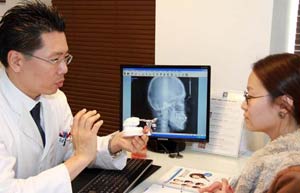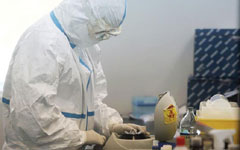Last year the company received 10,000 patients for advanced checkups, and among them 60 percent came from outside the city. Nearly 100 patients opted to go abroad using its overseas medical tourism services.
Ciming has developed more than 50 partnerships around the world, including in Japan, Switzerland, Singapore, the US and South Korea.
Saint Lucia Consulting, a company opened in Beijing in 2011, previously told China Daily that in the past four years, it has provided Chinese corporate executives, the wealthy and their families with highly personalized medical tourism services, expert translation services and advice on their overseas medical treatments.
CEO Cai Qiang says the company has contracts in the US with Partners HealthCare, the largest network of hospitals affiliated with Harvard Medical School, including Massachusetts General Hospital, Brigham and Women's Hospital, Dana Farber Cancer Institute, McLean Hospital and Spaulding Rehabilitation Hospital.
|
 |

|
"Patients in Europe and the US usually choose overseas medical services when the overseas services are much cheaper, and they do this through commercial insurance, while Chinese tourists going aboard are looking for high-end medical services and mostly paying their own bills. They look for treatment for cancer or diseases that are hard to find in China."
But compared with neighboring countries such as South Korea and Thailand, medical tourism in China is still in its infancy.
Part of the reason is the stringent requirements of the Chinese government, says Liu Tingfang, a professor at the Institute for Hospital Management, Tsinghua University.
"Hospitals are required to have less than 10 percent of high-end services so as to ensure the public's medical services," Liu from Tsinghua University says. "Moreover, there are few high-end medical services. We need to allow more private hospitals and foreign hospitals in China so that we can attract more international patients."
Some have already opened. Hainan province has designated Sanya Traditional Chinese Medicine Hospital as a pilot hospital and has been marketing services to Russia, the Middle East and northern Europe. It treats an average of 3,000 overseas patients a year with each patient spending $20,000, hospital head Chen Xiaoyong says. The hospital has treated 30,000 overseas patients.
Recently, Beijing and Shanghai also started such initiatives to expand the medical tourism market.
Liu from Tsinghua University says China needs to build a medical certification system accepted worldwide. "Only by showing certifications can we gain trust from international patients, and it also facilitates the reimbursement process of commercial insurance companies."
Official figures show China has 14,200 hospitals at county level and above, and 1,500 tertiary-level hospitals at the top level. Liu suggests that the government pick some as pilot hospitals to offer more market-oriented medical services. "Otherwise we will miss the opportunities in this niche market," Liu says
Lack of recognition and certification is a big hurdle for TCM in Europe, experts say. Since TCM arrived in Europe, its treatments have been classified as supplements rather than medicine, and they cannot be sold in pharmacies.
